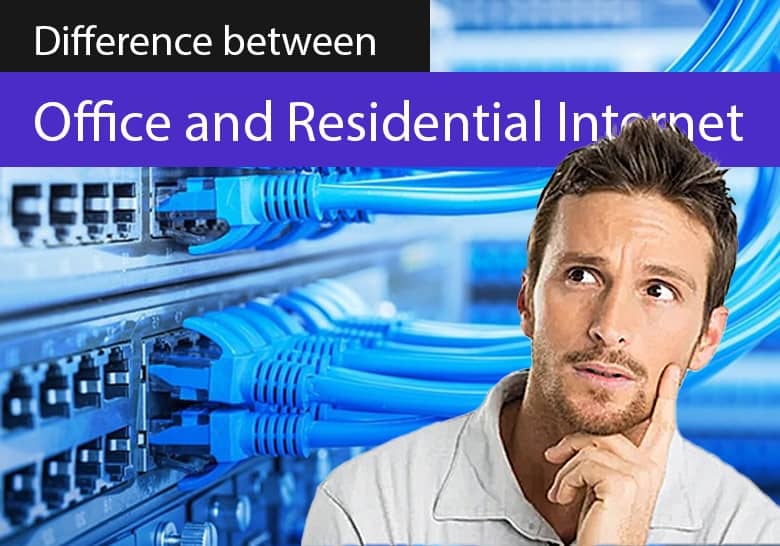As of late, accessing the web has become progressively significant. Work and business have been led from home, including normal corporate tasks, client communications, and even transaction handling. With this much internet use, you may be addressing whether you should change to business internet providers or contact a residential internet provider.
Obviously, the two types of internet connection exist. The plans do vary, however, and the expenses can contrast decisively. Regardless of whether the two of them might have a similar speed. For what reason is one more costly than the other?
Trivial details are where there are contrasts. Utilization of the internet at home and at work contrasts altogether. The difference between office and residential internet can include the below-mentioned points:
Fast Internet Speed
The speed of residential and commercial internet is one of the key distinctions. While the marketed speed for business internet speed can be as high as 1,000 Mbps or even 2,000 Mbps, it comes at a higher price. Home internet speed ranges from 1 Mbps to 25 Mbps. Faster internet speeds are necessary for organizations, especially when dealing with operations, client meetings, and customer service.
Price
Home internet is less complicated than business internet, thus it requires less maintenance, which concludes that the Home Internet is more affordable. The majority of household internet plans cost approximately $20 per month, however business internet services can cost anywhere from $60 to $500 per month or even more, depending on the Internet plan.
IP address
While residential internet has a dynamic IP address, business internet is given a static IP address. Static IP addresses give organizations the ability to host their network infrastructure, including servers and file storage, as they are more dependable and secure.
On the other hand, residential internet connections with dynamic IP addresses are typically less stable and secure and can change at any time without the provider’s knowledge. Residential internet connections that don’t demand enterprise-level security and bandwidth utilization frequently encounter them.
Bandwidth Allocation
Having a dedicated bandwidth allocation is essential for a business’ operations since they need reliable internet connectivity. Additionally, the organization now has additional capacity and more secure connectivity. Point-to-Point is the name of this dedicated bandwidth (P2P).
When there is a high demand for bandwidth for residential internet, there are noticeable performance changes, such as sluggish internet speed or connection hiccups. An alternative name for this is Point-to-Multipoint (P2MP) or Gigabit Passive Optical Networks (GPON) when the connection is supplied to a network of users rather than a single user.
Service level agreements
An SLA, or service-level agreement, is a contract between a service provider and its clients that specifies the services the provider will offer as well as the performance benchmarks. SLAs are used by internet service providers to control client expectations and to define when they are not responsible for performance problems or outages. Business clients are given these parameters so they can compare them to other vendors’ SLAs and know what to expect from providers (residential clients typically receive less-binding “best effort” commitments). In the event that the service level is not met, SLAs also specify how compensation will be given, such as through credits or a refund.
Customer Services
It is not surprising that customer service is greater for business internet because it typically comes with SLA that includes customer support and is more expensive. There are even commercial internet plans that come with VIP customer service, depending on the package.
Residential internet users, on the other hand, are also assured of first-rate customer service, but this is true for all of their clients. As a result, client support can occasionally be slower than it is for business accounts.
In contrast to commercial internet users who frequently interact with account managers, residential internet users may encounter the need to go through numerous departments before speaking with the appropriate person in the event of a problem.
Do you need a business internet connection?
Basically, it depends on how people use the internet for their business and in what quantity. High-speed home internet is frequently sufficient if the majority of your activities involve internet browsing, reading emails and other communication channels, possibly uploading and downloading small-size files, and having brief video chats with your team.
Let’s say your company has more than five employees that share a single internet connection, upload, and download files that are huge in size, and hold HD teleconferences that last for a long time. The business internet service is the best option in that situation. This is essential if you converse online with clients and consumers because you wouldn’t want to worry about losing your internet connection in the middle of a sale.
Business internet services are highly advised for companies that heavily rely on customer service. Unexpected increases in the number of calls to be handled and occasionally even simultaneous calls may occur. Calls with the customers may range in length as well. Your internet connection must therefore be able to manage all of this load.
Conclusion
Business internet access becomes necessary rather than optional when your company expands and you employ more sophisticated technologies like your infrastructure, mail server, and other enterprise-level software. Business internet connections are safer since handling customer data necessitates strong information security. Before switching from residential internet to office internet or office internet to residential internet, evaluate your company’s needs. Although the promises of a business internet account are encouraging, a small business owner or someone working alone from home may find the price to be prohibitive.

